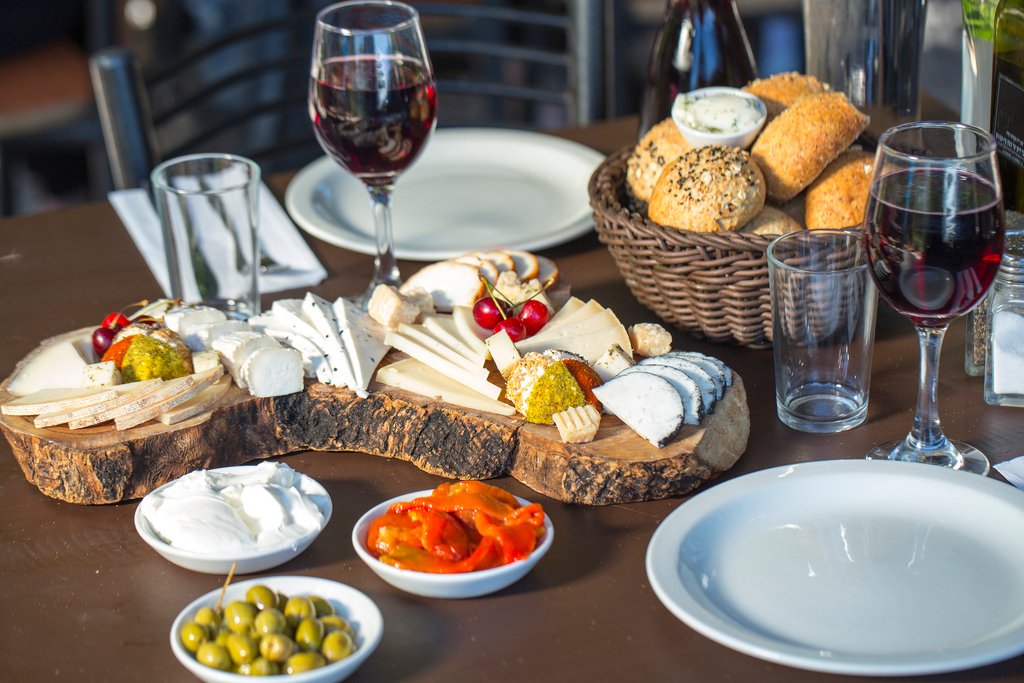Today we’ll be looking at the basics of how food and wine interact with each other. As with the rest of the series, most of the material is adapted from the WSET textbook “Wines and Spirits: Looking behind the label” and conversations I had in class. I’m not intending to make this a self-containing reference book, so the contents will most likely be heavily condensed and may not cover everything in the curriculum.

Photo from here (@israeltourism, Flickr) under CC licence.
Topic 2: Pairing Food with Wine
2.1. Overview
Food and wine interact with each other and the purpose of wine pairing is to take advantages of these effects. However, not all effects are positive. Sweetness and umami in food tend to make wines more difficult to enjoy as they strengthen bitterness and acidity of the wine while reducing our perceptions toward sweetness and fruitiness. Salt and acidity usually acts the other way and makes the taste of the wine ‘softer’. As a rule of thumb, food usually impacts our perception toward wine more than the other way around, especially the negative impacts. One thing also worth noting is that people have different sensitivities to various flavours and this is independent to the matter of personal preference. So this is also one thing that one should take into account when pairing wine with food.
2.2. Primary interactors

Sweetness can make a dry wine to seem to lose its fruitiness and make it unpleasantly acidic to consume. When pairing with any dishes that contain sugar, it is generally a good idea to choose a wine with higher level of sweetness. Umami, usually referred as the ‘savoury taste’ is how our taste receptors respond to glutamate. Food with high umami but low salt level is generally considered difficult to pair with wine. Some examples of such foods include asparagus and mushrooms. Food with sufficient salt to counteract the effect, say hard cheeses and smoked salmon are much easier to pair. Salt and acidity generally are very good companions to food. However it is worth noting that highly acidic food can make wine seem flat. Bitterness is an interesting one. Unlike other elements, bitterness in food and beverages tend to compliment each other instead of stripping each other’s away. Alcohol increases the burning sensation of chilli. It highly depends on the individual on whether this is a positive effect.
2.3. Other considerations
While exception exists, it is generally a good idea to match food and wine with similar intensity so that one does not overpower another. Most people enjoy combining acidic wine with fatty food to ‘cut through’ the richness. While subjective, it may also be worth considering matching sweet and salty flavours together. Such as sweet wine and blue cheese.
2.4. Applications
2.4.1. Foods
Please note that this section is almost a complete extract of the WSET textbook.
- Dishes high in sugar should be paired with a wine that has at least as much sugar
- Dishes high in umami should be paired with wines that are more fruity than tannic. High level of umami can also be balanced by addition of acid or salt
- Dishes high in bitterness should be considered pairing with white wines or low-tanning reds
- Dishes high in chilli heat should be paired with white wines or low-tannin reds, both with low alcohol. Choose a wine with relatively high fruitiness and sweetness
- Highly acidic foods should be paired with highly acidic wine, otherwise the wine can taste soft and flabby.
2.4.2. Wines
While less exciting, it is a safe idea to pair food with unoaked wines with simple structure and low residual sugar. Wine that have complex structural components, are oaked, has prominent level or tannin or alcohol are generally risky to pair with food. However, these wines often have the highest potential for interesting results.
Previous notes on wine:
